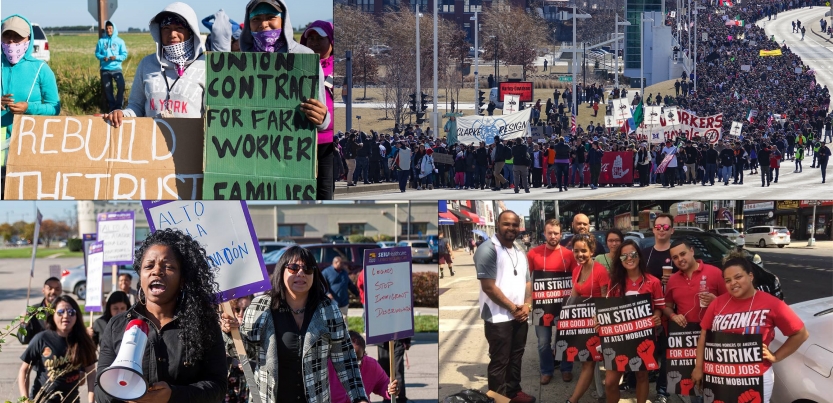Donna Cartwright
December 5, 2019
Podcast: Play in new window | Download (Duration: 1:19:15 — 65.1MB)

At the Boston DSA/Solidarity Socialist Day School in September, the centrality of the working class to the fight for socialism was the topic of the second panel of the day. [Listen to it HERE]
Bhaskar Sunkara of Jacobin magazine was first up; he stressed that only the working class has the social power to seriously challenge capitalism both inside and outside the workplace. Next, Solidarity member John Fitzgerald, a public school teacher and activist in the Massachusetts Teachers Association and Educators for a Democratic Union, discussed the rank and file strategy as a way to end the isolation of socialists and socialist organizations from the day to day struggles of the organized sectors of the working class. This approach is key to reviving socialist consciousness in the working class and building a revolutionary socialist workers’ movement in the U.S.
Karin Baker, also a Massachusetts teacher and member of Solidarity and DSA, talked about “what the rank and file strategy is like when you’re doing it,” including a successful statewide campaign to replace a top-down, service oriented bureaucratic union leadership with reformers who were willing to fight back and who went on to organize against and defeat an anti-union ballot initiative. Laura Gabby, a member of the Carpenters Union in NYC, joined the DSA, along with other progressive members of her local, and campaigned to defend the union hiring hall and challenge unsafe working conditions.
Listening to them brought me to reflect on my own experience as a longtime activist in the NewsGuild; I shared some of that in the Q&A section of the workshop.
I spent 30 years of my life implementing the rank & file strategy even before it had that name, starting when the International Socialists (I.S.) was founded in 1969. I believed in it then and I believe in it now.
I believe that for socialists who want to influence the working class, the best way to do that is to work with and to work in the working class. I felt and still feel that belief is borne out in my own experience.
But there’s a pitfall for socialists in the workplace, when we get immersed in union activity and union agitation, and tend to get tunnel vision about unions, that everything is about unions. We have to remember that unions are an adaptive response of the working class to capitalism. We wind up with a kind of equilibrium with capitalism, in which we build worker power and make gains, and yet in the larger sense we are always losing ground.
Very often the conversations we have in the workplace don’t go any farther than — we need better, stronger, more militant, more democratic unions. That’s all true, but not sufficient. The operative part of the rank and file strategy is to rebuild the socialist and communist layer in the working class, the militant minority, that had been crushed and driven out of the workplace in the 1940’s and 1950’s. That goal requires that we go beyond militant unionism, and have those “last-mile” conversations — how we’re about something more than unionism; we’re about a new world, a different world.
And very often in my experience that was the conversation we never got to. It seemed that people were not receptive, and this was just a little bit too much for the present moment. At least in large part, our failure to have those conversations had to do with the lingering conservatism of post-World War II America, where socialism was a word that was rarely uttered outside of college campuses and small leftist groups.
Nevertheless, I am now much more optimistic about the possibility of bringing those ideas into the workplace and into unions. In the last few years, a critical attitude toward capitalism is much more widespread than it was during my working life, and socialism is not such a strange, alien idea. Now may be the time that so many of us waited for, for so long.
Donna Cartwright is a member of Solidarity and of DSA in Baltimore.
